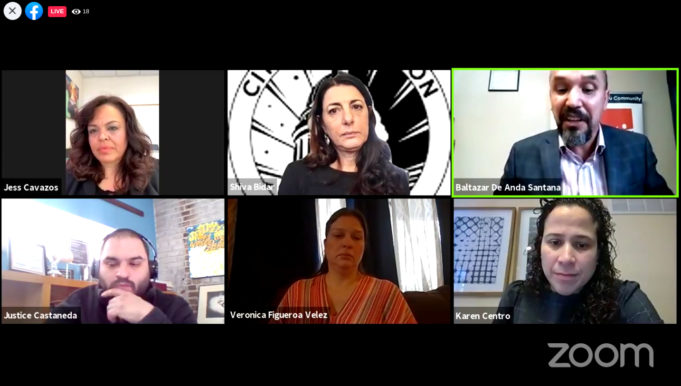Back in late March, the Latino Consortium for Action announced the creation of a new Emergency Relief Fund which would benefit those most affected by COVID-19 in the Latinx community, including undocumented Latinx workers and small, immigrant-owned businesses.
On Tuesday, Jan. 19, Latinx community leaders held a Zoom press conference to announce that they are reopening the Latino Consortium for Action Relief Fund. The speakers included Jessica Cavazos, CEO of the Latino Chamber of Commerce of Wisconsin; Veronica Figueroa, executive director of UNIDOS; Baltazar de Anda Santana, executive director of the Latino Academy of Workforce Development, Alder Shiva Bidar; Justice Castañeda, executive director of Common Wealth Development; and Karen Menéndez Coller, executive director of Centro Hispano
Menéndez Coller said that the COVID pandemic has significantly affected the Latinx community. “Although we make up seven percent of the state’s population, our community makes up 11 percent of the state’s confirmed COVID cases and 12% of hospitalization,” she said.
“The impact of COVID on our community has been compounded by a higher percentage of our members working in essential industries devastated by COVID,” Menéndez Coller added. “As we navigate our way out of COVID, we are proud to report the success of our efforts to financially sustain our community. Today we are announcing that we have released an LCA Relief Fund Impact report that can be found on Centro’s website.”
Some of the information from the report included:
- 2,112 applications were received from Dane County residents in desperate financial need, essential workers in this community asking for support;
- $1.18 million dollars were raised by LCA partner agencies and distributed to those in the Latinx community ineligible for federal aid;
- Over 10,000 hours invested by an army of volunteers connected with LCA partners that mobilized when so many others were still figuring out what to do.
“Today we came together to make this announcement: we are reopening the LCA Emergency Relief Fund. As a recipient of funds in 2020 told us: ‘I am undocumented and I am no one, I can’t receive support from any place… thank you, thank you, thank you for what you are doing,'” Menéndez Coller said. “We are reopening the LCA Relief fund not by choice but because of the need and we ask you and the City of Madison to stand with us as a partner at the table.
“The LCA opposes the City of Madison proposed rental assistance resolution 63792 because it overlooks the needs and strategies already in place within the Latinx community,” she added. “We support the rental assistance alternate resolution that equitably centers community needs, community work, and community voice so that we can all emerge out of this pandemic ready to thrive.”
Bidar said that she feels it is critical for the City of Madison to be investing in organizations like the Latino Consortium for Action and will be sponsoring the alternate resolution at the Common Council meeting tonight. She said that she has the support of eight alders.
“We will try to rectify some of the structural problems that I feel we have with the way that we invest our resources and our funding,” she said. “We rectify this by designating the Latino Consortium for Action, along with a number of other organizations led by people of color who are doing work in their communities so we can continue to serve those who are most in need and who are often most marginalized from systems.”
COVID-19 continues to deeply impact so many in the Latino community. At this moment, the biggest needs for this community are resources so that they can meet their basic needs, especially with rental assistance.
“We are here united strongly to provide this important information on the LCA Relief Fund that was a much-needed lifeline for Latinx businesses here in Dane County and our support at the [Latino] Chamber [of Commerce] will continue throughout this fight,” Cavazos said.
De Anda Santana said that the support provided to the Latino community was not just financial.
“Because of the strength of this Consortium, we were able to connect those most in need with much-needed resources like mental health, employment, food access and legal and COVID information,” he said. “Our Latinx community trusted us and we were so humbled to be able to provide support to our community. Many hours went into this work.
“The Latino Consortium for Action demonstrated that we have the capacity to develop, establish and execute processes that help many of our undocumented community members,” he added.
To donate to the Latino Consortium for Action Relief Fund, click here.




























